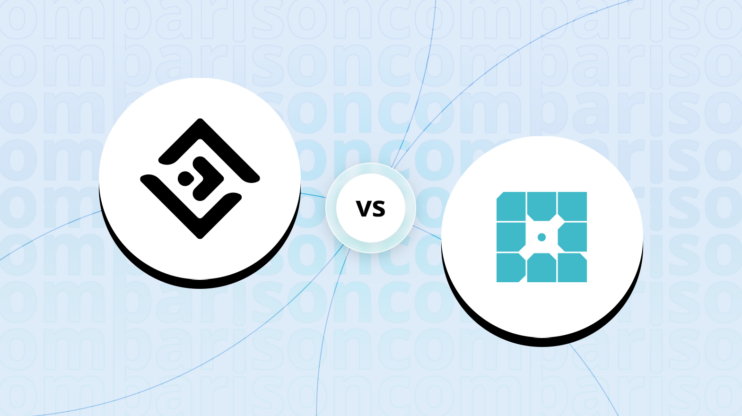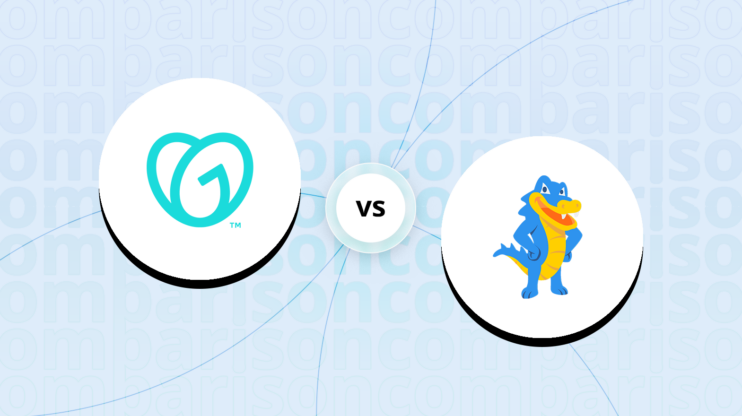Godaddy vs WP Engine: Final verdict
Looking over GoDaddy vs. WP Engine, it’s clear why both hosts are so popular. They have both hosted millions of
websites that run on WordPress for decades, building up a loyal customer base.
WP Engine (Overall grade: 8.6)
sets itself apart with exceptional managed WordPress hosting, prioritizing features tailored for optimized performance and security. Its standout strengths include excellent uptime, enhanced WordPress-specific capabilities, and superior customer support. WP Engine’s EverCache® technology, seamless global CDN integration, and multiple environment setups for development, staging, and production promote high efficiency and speed. Users also benefit from in-depth threat detection and advanced DDoS mitigation. Though the service comes at a higher price point, WP Engine delivers premium value for businesses focusing on performance and security— the ideal choice for high-traffic sites, agencies, and developers.
GoDaddy (Overall grade: 7.8)
excels in providing a broad range of hosting plans, making it versatile for users from personal bloggers to small businesses. Its key strength lies in affordable, comprehensive packages that include free domains, email hosting, and an intuitive website builder. GoDaddy offers unmetered bandwidth, making it a practical option for high-traffic sites. Frequent add-ons like the AI creation tool and WordPress migration support enhance its appeal. However, it falls short in delivering consistent uptime and faces criticism for upselling tactics and high renewal costs. Despite these setbacks, its varied hosting options and user-friendly features make it a viable option for budget-conscious users and beginners.
 Overall grade:7.8 |
 Overall grade:8.6 |
|
|---|---|---|
| Uptime and Availability | 8.6 | 9.6 |
| Hosting Performance | 8.1 | 9.1 |
| Hosting Security | 8.6 | 9.4 |
| Price | 7.7 | 8.1 |
| Hosting Features | 7.1 | 6.8 |
| Ease Of Setup | 8.7 | 8.3 |
| User Management | 5.0 | 8.8 |
| Customer Support | 8.2 | 8.9 |
| User feedback | 3.9/5 | 4.6/5 |
Hosting Types Offered
Both platforms provide a variety of hosting types, each designed to meet the different needs of users.
 |
 |
|
|---|---|---|
| Shared hosting | ||
| Cloud hosting | ||
| WordPress hosting | ||
| Ecommerce hosting | ||
| VPS hosting | ||
| Dedicated hosting |
Although both offer a variety of hosting plans tailored to different needs, in
certain cases, one platform may prove to be more suitable.
Detailed comparison
Uptime and availability
Evaluates the average uptime statistics, uptime guarantee and overall availability of the hosting
provider
Score Components:
- Uptime percentage (30%): evaluates the uptime statistics in given period of time
- Uptime guarantee (20%): Assesses if the platform offers an uptime guarantee and
whether the actual uptime matches the promised guarantee. - General performance (25%): Evaluates how fast is the average response time and overall
it’s stability. - Responsiveness (10%): Adaptability to different devices and screen sizes.
- Availability (25%): Reflects the total downtime and number of outages.
 8.6
8.6
 9.6
9.6
🏆 Winner: WP Engine: Superior uptime and proactive maintenance make WP Engine the top choice.

Both GoDaddy and WP Engine are renowned for their commitment to uptime and availability, catering to businesses of all sizes. GoDaddy offers a commendable uptime guarantee of 99.9% and has shown an actual uptime rate of 99.98% during two months of testing. Its server response time of 341ms and efficient global load times showcase strong performance. However, GoDaddy’s WordPress hosting experiences frequent short downtimes, which can be a cause for concern for some users. The compensation for downtime is limited to service credits, which might not fully mitigate the impact of outages.
WP Engine stands out with an exceptional uptime performance, achieving a flawless 100% uptime over a two-month period. Its average server response time is 489ms, paired with minimal response time variation, indicating remarkable stability. The platform’s 99.99% SLA is highly reliable, backed by extensive global data centers that reduce latency and enhance site performance. Automated updates, daily backups, and 24/7 global support ensure websites remain secure and available. These features make WP Engine the more reliable choice for users prioritizing consistent uptime and proactive site maintenance.

Which one has better hosting performance?
Score Components:
- Hosting speed (30%): This includes SSD quality, Load times, PageSpeed score ranges,
additional information on website speed, built-in plugins for performance enhancement, available caching
methods, and CPU/RAM options - CDN (20%): Considers whether CDN is available or not, whether it’s free or paid, and
the quality of the CDN service - Available data centers (30%): Evaluates the number of data centers and their locations
globally. - Scalibility (20%): Looks at whether elastic scaling is available, the process required
to scale (manual upgrade vs. automatic scaling), the presence of dedicated servers, and the costs
associated with scaling.
 8.1
8.1
 9.1
9.1
🏆 Winner: WP Engine: Superior performance and specialized WordPress features. WP Engine outshines GoDaddy in terms of general performance with its EverCache® technology and robust Global CDN, which significantly reduce load times. Both hosting services offer SSDs, but WP Engine’s emphasis on the latest PHP versions boosts its site performance. GoDaddy provides unmetered bandwidth and shared or dedicated resources depending on the plan, whereas WP Engine offers isolated resources for consistent performance. Both hosts have global data centers, but WP Engine ensures better CDN integration with over 200 points of presence, enhancing global reach.
WP Engine outshines GoDaddy in terms of general performance with its EverCache® technology and robust Global CDN, which significantly reduce load times. Both hosting services offer SSDs, but WP Engine’s emphasis on the latest PHP versions boosts its site performance. GoDaddy provides unmetered bandwidth and shared or dedicated resources depending on the plan, whereas WP Engine offers isolated resources for consistent performance. Both hosts have global data centers, but WP Engine ensures better CDN integration with over 200 points of presence, enhancing global reach.
Website Speed
WP Engine sets itself apart with fast page load times due to its proprietary EverCache® technology, which optimizes server response. Its use of the latest PHP versions further speeds up performance, allowing quicker processing of requests. GoDaddy offers good speeds with its optimized servers and global data centers, and it also includes a 1-click WordPress install. However, WP Engine’s focus on WordPress-specific enhancements and Core Web Vitals optimization leads to noticeably faster load times, making it the better choice for performance.
Scalability
WP Engine provides a scalable architecture that can handle traffic spikes without manual intervention. It offers isolated resources to ensure performance remains steady even during surges. While the details on the cost for scalability are not specified, the focus on automated updates and real-time monitoring supports smooth scalability. GoDaddy also provides options to upgrade to more powerful plans with dedicated resources or VPS Hosting but lacks the seamless auto-scaling capabilities found in WP Engine. Costs for scaling with GoDaddy are clearly outlined, depending on the VPS configuration or shared hosting upgrade path you choose.
Which one has better security features?
and regulatory requirements
Score Components:
- Technical security measures (40%): This includes encryption, firewalls, DDoS
protection, secure configurations, server monitoring, access control and availability of security addons
(e.g Sitelock security). - Operational security measures (30%): Encompasses data privacy, backups and data
redundancy. - Compliance and certifications (20%): Adherence to legal and regulatory requirements
(e.g., GDPR, HIPAA) and possession of certifications (e.g., ISO 27001, SOC 2). - Business and reliability (10%): Factors in the provider’s reputation, uptime
guarantees, and customer support.
 8.6
8.6
 9.4
9.4
🏆 Winner
WP Engine: High-performance WordPress hosting featuring enterprise-grade security and compliance.
Both GoDaddy and WP Engine, have notable differences in their approaches to technical and operational
security, as well as in their compliance with regulations.
Technical security measures:
GoDaddy includes various technical security features like AutoSSL, DDoS protection, a Web Application Firewall (WAF), and CloudLinux for resource management. They also provide malware scanning and daily backups. WP Engine offers advanced technical measures, including real-time threat detection, monitoring, and automatic core updates. WP Engine additionally uses global edge security featuring advanced DDoS mitigation and Argo Smart Routing for faster and more secure traffic management.
Operational security measures:
GoDaddy provides 24/7 customer support via phone and chat. They offer managed and automated updates for errors, sitemaps, and firewall settings. WP Engine also provides round-the-clock global support with a 97% satisfaction rate, and premium support options for enhanced assistance. WP Engine performs live threat detection and proactive security alerts, ensuring that threats are mitigated in real-time. They also offer managed WAF and DDoS mitigation as part of their operational security.
Compliance and certifications:
GoDaddy is fully GDPR compliant and offers PCI-certified products like WooCommerce Hosting. They recommend third-party products for secure payment processing. WP Engine is SOC-2 compliant and ISO 27001-2013 certified. WP Engine’s PCI vulnerability scanning includes results that may vary due to customized components.
 |
 |
|
|---|---|---|
SSL certificate |
AutoSSL, Managed SSL Service, Self-Managed SSL Certificates |
Free SSL certificates and platform-level protection |
Additional security features |
Malware scanning and removal, WAF, daily backups, DDoS protection |
Continual monitoring, automated updates, managed WAF, DDoS mitigation |
PHP versions |
Latest PHP versions (PHP 7.4 and 8.0) |
Not specified |
GDPR compliance |
Yes |
Not specified |
HIPAA compliance |
Not specified |
Not specified |
PCI compliance |
Yes (WooCommerce Hosting and GoDaddy Online Store) |
May be included in PCI vulnerability scanning scope (results may vary) |
Hosting features
Score Components:
- Domains (20%): Assesses the availability of a free domain, domain purchase options, and
pricing - Email (15%): Considers if the provider offers full email hosting, or is reselling
third-party service, and if the email is only transactional or not - Website builder (15%): Checks if website builder is available, and it’s user
friendliness and overall the level of customization allowed. - Staging environment (20%): Determines if a staging environment is available, allowing
for testing changes before going live. - FTP & SFTP accounts (10%): Evaluates if and how easily users can access FTP and
SFTP accounts - Git and SSH access (20%): Assess whether Git is integrated into the hosting service and
if SSH access is provided
 7.1
7.1
 6.8
6.8
🏆 Winner GoDaddy: Offers a wide range of hosting plans with comprehensive free services.
GoDaddy and WP Engine both present impressive hosting solutions, but they cater to slightly different user needs. GoDaddy excels in providing a variety of hosting plans suitable for personal bloggers to small businesses, with noticeable perks such as free domains and email hosting. It’s user-friendly with its inclusion of a free website builder, and many plans include a free SSL certificate. GoDaddy is exceptionally appealing to small businesses due to its unmetered bandwidth, making it a robust option for high-traffic sites without additional costs. Innovative add-ons like the AI creation tool and free WordPress migration simplify the process for beginners and those transferring existing sites.
On the other hand, WP Engine is tailored towards users who desire premium WordPress-centric features alongside high-end performance and security. It offers a fully managed WordPress experience with notable enhancements like the EverCache® technology for improved site speed. The inclusion of multiple environments for development, staging, and production make it a strong contender for advanced developers. WP Engine also emphasizes security with features like advanced DDoS mitigation and a WordPress-optimized Web Application Firewall. While it does provide free SSL certificates and daily backups, its starting price is steeper compared to GoDaddy, aligning more with businesses who prioritize performance over cost.
 |
 |
|
|---|---|---|
Free domain |
Yes |
Yes |
Free SSL |
Yes |
Yes |
Email hosting |
Yes |
Yes |
Website builder |
Yes |
No |
Staging environment |
Yes (WP Managed Deluxe+) |
Yes |
FTP & SFTP accounts |
Yes |
Yes |
Git and SSH access |
No |
Yes |
Free backup |
Yes |
Yes |
Money back guarantee |
Yes 30 days |
No |
a location.
As a result in rare cases the features mentioned here can differ from the ones you see on their websites.
Both providers support a range of users from beginners to experts with user-friendly website builders and WordPress staging areas. However, in terms of developer tools, both GoDaddy and WP Engine offer robust options including SSH access, support for multiple programming languages, and Git for version control, thus appealing to developers looking for advanced capabilities.
Email services:
GoDaddy includes free email hosting with many of its plans, making it convenient for businesses to set up professional email accounts without extra costs. Transactional email capabilities are not explicitly highlighted, but the provision for email campaigns stands out. WP Engine, while managing WordPress-specific emails and offering advanced security measures, lacks integrated email hosting services. Instead, it resells third-party services like Google Workspace and Outlook, which come at an additional cost.
Price
Score Components:
- Plan value (40%): What each pricing tier offers.
- Transparency and clarity (30%): Clearness of pricing structures.
- Flexibility of plans (20%): Range of options to suit different budgets.
- Hidden costs (10%): Additional expenses not included in the plan.
 7.7
7.7
 8.1
8.1
🏆 Winner WP Engine: Elevated above its competitor with comprehensive and user-friendly managed WordPress hosting plans.
Evaluating the pricing of plans among various hosting providers can be complex due to their differing pricing and renewal strategies. Additionally, certain plans require annual commitments, which adds to the difficulty of making comparisons. The prices listed are based on monthly commitments; plans requiring annual commitments are indicated. Additionally, although some providers offer identical plans for WordPress and shared hosting, we have created separate tables for each to enhance clarity.
The second paragraph compares the pricing plans focusing on features such as price, plan duration, and any unique offerings. WP Engine offers specialized managed WordPress hosting plans that start at higher price points but include more comprehensive features, such as priority support and global CDN. Conversely, GoDaddy provides both shared (Web Hosting) and WordPress hosting plans with attractive introductory pricing, which increases significantly upon renewal. GoDaddy’s Web Hosting Economy plan, for instance, starts at $5.99/month with a high renewal rate, while WP Engine’s Startup plan begins at $20/month with robust included features. User reviews further position WP Engine as superior in customer satisfaction and technical support.
 |
 |
|---|---|
|
Managed WordPress Basic $12.99:
1 website, 10 GB NVMe storage, standard bandwidth, weekly backups, AI creation tool, automated malware scans & removal. Value for price:7.5
|
Startup Plan $20:
1 website, 10 GB local storage, 50 GB bandwidth, automated backups, auto-renewing SSL, global CDN, 10 premium themes, 24/7 chat support. Value for price:8.0
|
|
Managed WordPress Deluxe $13.99:
1 website, 20 GB NVMe storage, standard bandwidth, daily backups, AI creation tool, enhanced security, staging site. Value for price:7.8
|
Professional Plan $40:
3 websites, 15 GB local storage, 125 GB bandwidth, automated backups, auto-renewing SSL, global CDN, 10 premium themes, 24/7 chat & phone support. Value for price:8.2
|
|
Managed WordPress Ultimate $15.99:
1 website, 30 GB NVMe storage, standard bandwidth, daily + on-demand backups, AI creation tool, SEO optimizer, staging site, WooCommerce integration. Value for price:8.0
|
Growth Plan $77:
10 websites, 20 GB local storage, 200 GB bandwidth, automated backups, auto-renewing SSL, global CDN, 10 premium themes, priority support. Value for price:8.4
|
|
|
Scale Plan $194:
30 websites, 50 GB local storage, 500 GB bandwidth, automated backups, auto-renewing SSL, global CDN, 10 premium themes, priority support. Value for price:8.5
|
|
|
Custom Plan $600:
Contact sales; extensive resources, dedicated account manager, advanced security features. Value for price:8.7
|
 |
 |
|---|---|
|
Web Hosting Economy $5.99:
1 website, 25 GB NVMe storage, shared RAM and vCPU, free domain, free email, 30-day guarantee, free SSL for 1 year. Value for price:7.0
|
|
|
Web Hosting Deluxe $7.99:
10 websites, 50 GB NVMe storage, shared RAM and vCPU, free domain, free email, 30-day guarantee, free, unlimited SSL. Value for price:7.5
|
|
|
Web Hosting Ultimate $12.99:
25 websites, 75 GB NVMe storage, shared RAM and vCPU, free domain, free email, 30-day guarantee, free, unlimited SSL. Value for price:7.8
|
|
|
Web Hosting Maximum $17.99:
50 websites, 100 GB NVMe storage, shared RAM and vCPU, free domain, free email, 30-day guarantee, free, unlimited SSL. Value for price:8.0
|
 |
 |
|---|---|
|
1 vCPU / 2GB RAM $8.99:
1 vCPU core, 2 GB RAM, 40 GB NVMe SSD, Linux only, snapshot backups, global data centers. Value for price:7.2
|
|
|
2 vCPU / 4GB RAM $17.99:
2 vCPU cores, 4 GB RAM, 100 GB NVMe SSD, Linux or Windows, snapshot backups, global data centers. Value for price:7.5
|
|
|
4 vCPU / 8GB RAM $34.99:
4 vCPU cores, 8 GB RAM, 200 GB NVMe SSD, Linux or Windows, snapshot backups, global data centers. Value for price:7.8
|
|
|
4 vCPU / 16GB RAM $44.99:
4 vCPU cores, 16 GB RAM, 200 GB NVMe SSD, Linux or Windows, snapshot backups, global data centers. Value for price:8.0
|
As a result in rare cases the prices displayed here can differ from the ones you see on their websites.
Enterprise plans
For enterprises, both WP Engine and GoDaddy offer comprehensive options. WP Engine’s Custom Plan stands out with dedicated account managers, advanced security features, and tailored resources at a starting price of $600/month. GoDaddy also offers plans like Web Hosting Maximum at $17.99/month, providing up to 50 websites, extensive storage, and free SSL for all websites. While GoDaddy’s pricing remains attractively lower, WP Engine’s superior support and prioritized resources make it the more robust choice for large-scale enterprise needs.
Godaddy vs WP Engine: Ease of setup
platform.
Score Components:
- Site migration (25%): Assesses whether the provider offers tools for site migration,
either automated or manual, and whether these services are free or require a fee. - Admin panel usability (35%): Evaluates the type of admin panel provided, such as the
standard cPanel or a custom solution, focusing on its accessibility and user-friendliness for both
technical and non-technical users. - Setup features (20%): Examines the availability and ease of use of various setup
features, including FTP accounts, file managers, email account setup, PHPMyAdmin, and easy CDN
configuration. - Help center quality (20%): Measures the quality and accessibility of the provider’s
help center resources, including articles and tutorials.
 8.7
8.7
 8.3
8.3
🏆 Winner
GoDaddy: Offers a simplified setup with a one-click installation process and additional support features.
GoDaddy utilizes an industry-standard cPanel for its admin panel, which is widely recognized for its user-friendly interface. cPanel allows users to manage multiple aspects of their hosting environment such as installing applications, managing backups, and fine-tuning security settings with minimal technical knowledge required. The accessibility of cPanel makes it suitable for both technical and non-technical users, providing an intuitive experience that helps streamline the setup and management of websites.
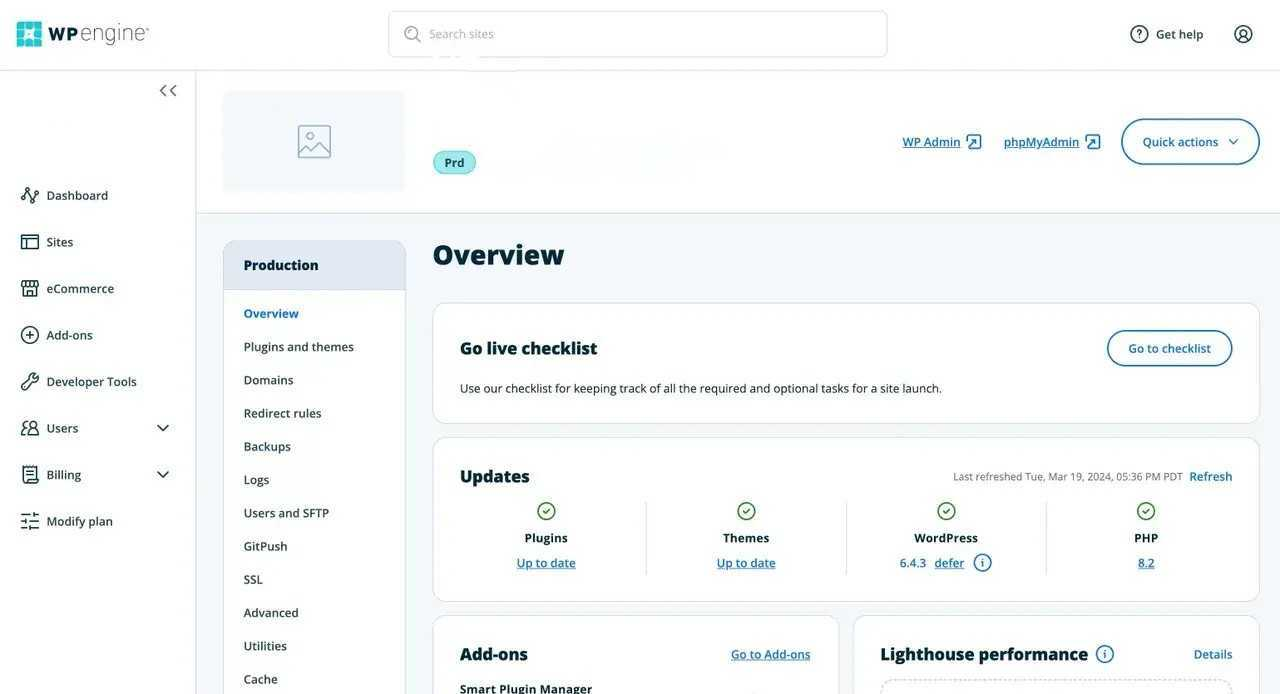
WP Engine, on the other hand, offers a custom-built admin panel specifically tailored for WordPress websites. While this might initially seem daunting for some users unfamiliar with WordPress-specific configurations, the platform simplifies many complex tasks. The custom interface is designed with a focus on performance and security, providing accessible features that cater to the needs of both developers and less tech-savvy users. Although not as universally familiar as cPanel, WP Engine’s custom admin panel is engineered to enhance user experience specifically within the WordPress ecosystem.
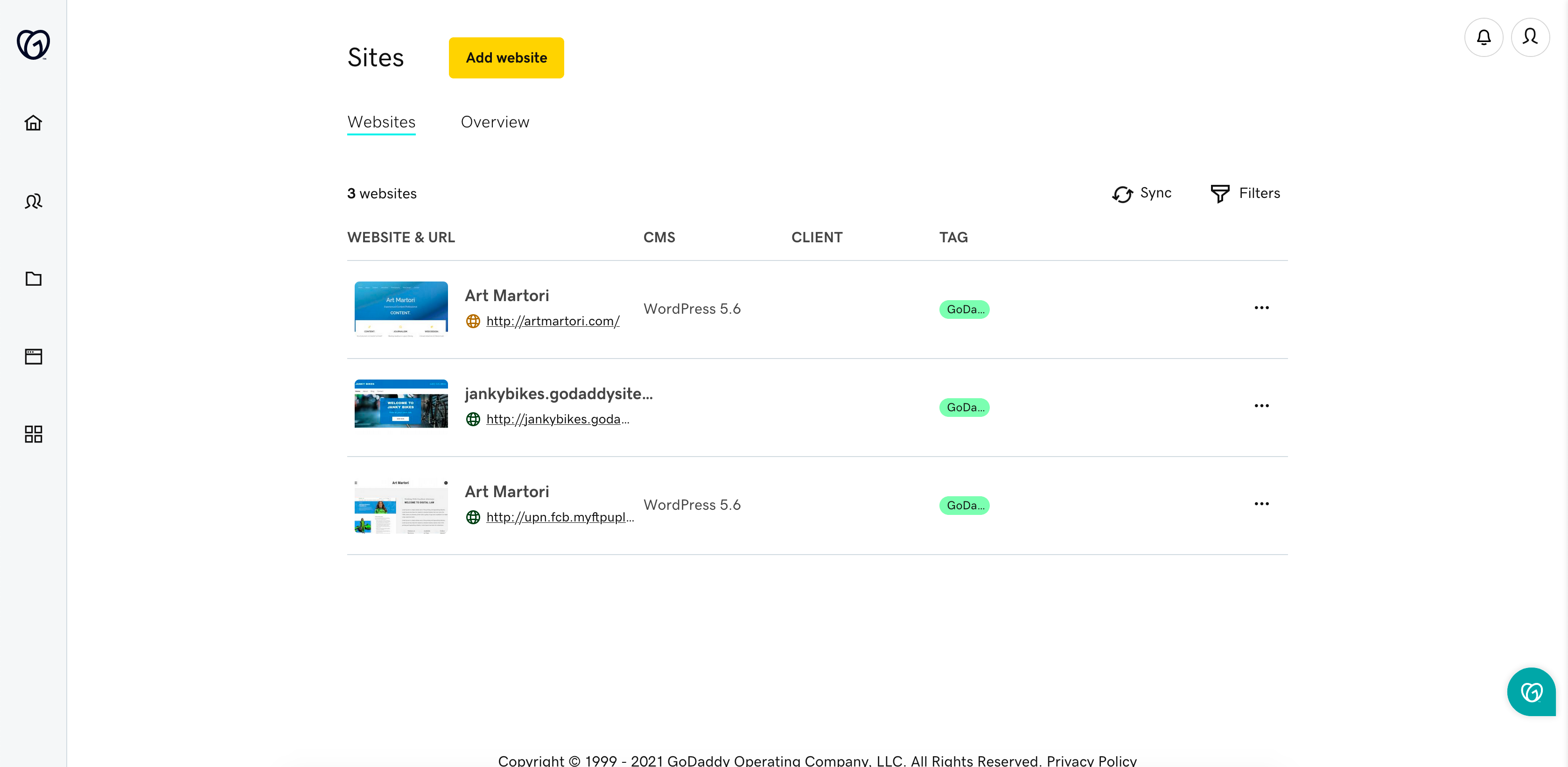
Both GoDaddy and WP Engine offer migration services for websites. GoDaddy provides a free WordPress migration tool, allowing users to easily transfer their existing WordPress site to GoDaddy’s hosting. This tool is streamlined for ease of use, requiring minimal effort from users. WP Engine offers an Automated Migration plugin that simplifies the process of transferring WordPress sites to its platform. It also provides detailed guides for manual migration when the plugin is not compatible. Both GoDaddy and WP Engine’s migration services are free, which aids users in transitioning their sites seamlessly.
The platforms provide extensive knowledge bases filled with guides, how-to articles, and instructional content. GoDaddy offers a wide range of resources alongside 24/7 chat and phone support. WP Engine also boasts a detailed help center with an intuitive search function and around-the-clock support via live chat, phone, and ticketing, ensuring comprehensive user support.
User management
accessibility.
Score Components:
- Role customization (40%): Flexibility in creating and defining user roles and
permissions. - Ease of management (30%): User interface and tools for managing users.
- Access control (20%): Effectiveness of access control measures for different user
levels. - Scalability (10%): Ability to manage a growing number of users efficiently.
 5.0
5.0
 8.8
8.8
🏆 Winner:
WP Engine: Delivers detailed control over user roles and permissions.
When it comes to user management features, WP Engine provides a more comprehensive suite of tools compared to GoDaddy. WP Engine offers a detailed breakdown of user roles such as Owners, Full users with and without billing, and Partial users with and without billing permissions. This allows for a nuanced assignment of responsibilities, ensuring that each user has access to the necessary environments and tools. GoDaddy’s user management capabilities aren’t explicitly detailed and lack specifics, making it less flexible and transparent in comparison. WP Engine’s clear delineation of roles and the ability to assign specific permissions provide businesses with better options for managing different levels of access.
WP Engine’s user interface for managing users is intuitive and user-friendly. Users can easily access the User Portal, where they can navigate through account settings, user roles, and permission assignments. The process of adding, editing, and removing users is straightforward, involving simple steps that can be quickly executed. GoDaddy, on the other hand, lacks detailed information about its user management interface, which can potentially make it harder for users to efficiently navigate and manage their settings compared to WP Engine’s streamlined dashboard.
Evaluating the effectiveness of access controls, WP Engine stands out with robust features to manage a large number of users efficiently. The ability to filter account activity logs by user, environment, and specific actions ensures that administrators can monitor and audit user activity effectively. This level of detailed tracking is not available for GoDaddy, which may pose challenges for businesses requiring meticulous access control and monitoring. WP Engine also supports unique features like managing SFTP logins, Git keys, CDN, and SSL certificates, further enhancing its capability to manage user access on a granular level.
WP Engine User Roles Table:
| Role | Description | Access highlights |
|---|---|---|
| Owner | Has full access to all features and settings. | Delete Sites, move Sites, close account, remove users, manage Smart Plugin Manager. |
| Full (with billing) | Can make billing changes and access billing section. | Cannot delete sites or users, can initiate and accept Transferable Sites, manage Smart Plugin Manager. |
| Full (no billing) | Has full access excluding billing changes. | Cannot initiate transfers or manage Smart Plugin Manager, can accept Transferable Sites. |
| Partial (with billing) | Access limited to specified environments and make billing changes. | Cannot manage Smart Plugin Manager, create or delete sites, or remove users, can copy and restore between environments. |
| Partial (no billing) | Access limited to specified environments, with no billing capabilities. | Cannot create environments or manage Transferable Sites, can copy and restore within accessible environments. |
Customer support
hosting provider.
Score Components:
- Support communication channels (30%): Measures the variety of customer support types
provided (live chat, chatbot, email, phone, etc.) - Availability (20%): Assesses the availability hours for each channel, including 24/7
support options. - Technical support quality (30%): Assesses whether the provider offers comprehensive
technical support, including hardware upgrades (e.g., HDD to SSD), software installations, and web
server configuration changes. - Enterprise support (20%): Checks if there are dedicated or priority support services
for enterprise-level customers.
 8.2
8.2
 8.9
8.9
🏆 Winner WP Engine: A superior choice for ease of access and satisfaction, with comprehensive customer support features.
 |
 |
|
|---|---|---|
Phone support |
||
Live chat support |
||
Chatbot |
||
Email/ticket support |
||
Enterprise support (dedicated agent, priority support) |
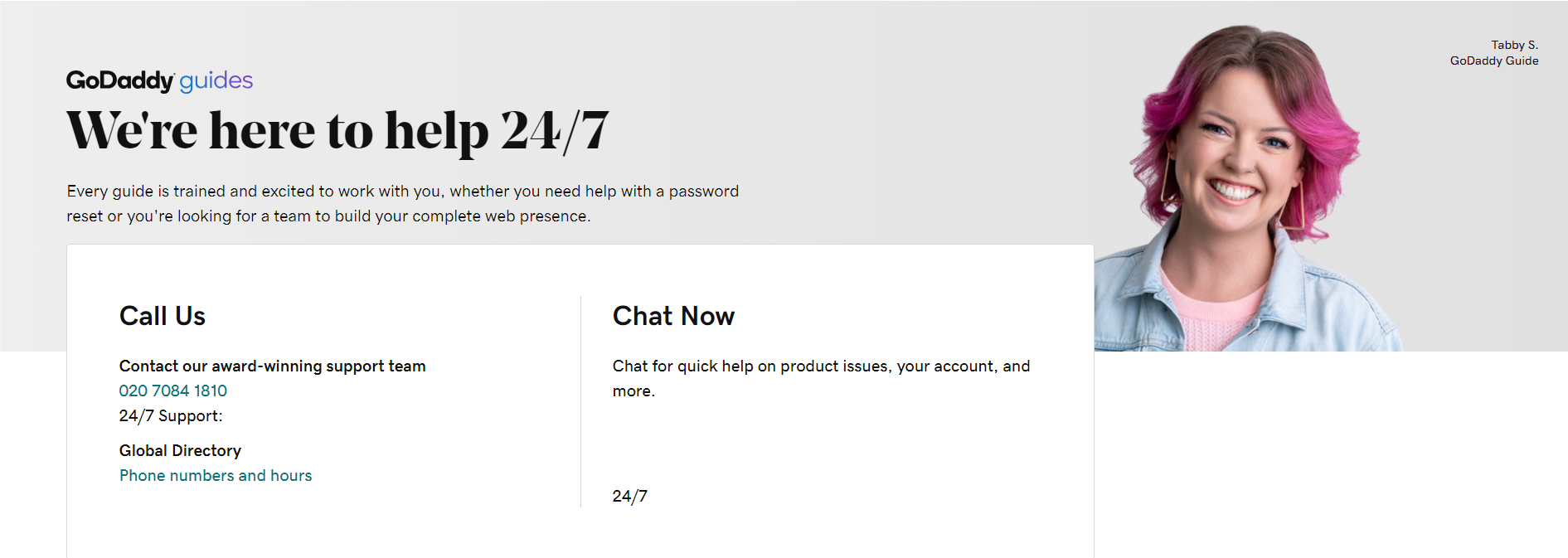
Both GoDaddy and WP Engine offer extensive customer support, including 24/7 phone support, live chat, and a detailed knowledge base. GoDaddy’s phone support includes both general and award-winning teams, and live chat is accessible on the U.S. subdomain. They supplement this with a free WordPress migration tool, daily backups, and SMS support. However, they do not provide specialized enterprise support, unlike WP Engine.

WP Engine stands out with its high customer satisfaction score and advanced customer support features. They offer phone and chat support around the clock, access to WordPress experts, and premium support options for dedicated agents. Their user portal consolidates plan management and technical support into one place. WP Engine’s detailed documentation and additional tools such as error logs, cache management, and security features make them a reliable choice for users requiring advanced support.
Godaddy vs WP Engine: User feedback
GoDaddy generally receives praise for its ease of use, affordability, comprehensive service offerings, and user-friendly interface, making it a popular choice for domain registration and basic web hosting. Many users appreciate the ability to purchase domains, web hosting, email services, and other digital products all in one place, along with frequent discounts for new customers. However, customer service experiences are inconsistent; while some users find it helpful and responsive, others report long wait times and unknowledgeable support staff. Additionally, recurring issues include high renewal costs, persistent upselling, and occasional technical difficulties.
WP Engine exudes excellence in managed WordPress hosting, boasting top-notch technical support that’s often highlighted as a standout feature. Users appreciate the user-friendly dashboard, seamless migration tools, daily backups, and solid security measures, all of which contribute to high performance and reliability. However, the service does come at a higher price point, which some users find steep, especially for entry-level plans or smaller projects. Despite occasional concerns about costs and some technical nuances, WP Engine’s premium service quality justifies the expense for many, making it a highly recommended solution for businesses and developers alike.
Godaddy vs WP Engine: FAQ
Which platform is better suited for hosting WordPress websites?
WP Engine clearly stands out for WordPress hosting due to its specialized WordPress-specific features, including EverCache® technology, comprehensive security measures, and optimized performance enhancements. While GoDaddy does offer WordPress hosting, WP Engine provides a more tailored and efficient solution for WordPress sites with superior uptime and development tools.
Which hosting service offers better security features?
WP Engine offers more advanced security features, including real-time threat detection, automated updates, and advanced DDoS mitigation. GoDaddy provides solid basic security measures like AutoSSL, DDoS protection, and malware scanning, but it does not match the depth and specialization that WP Engine brings to WordPress hosting security.
What are the major differences in pricing and value between godaddy and wpengine?
GoDaddy offers more affordable hosting plans with attractive introductory pricing, making it suitable for users on a budget. WP Engine, on the other hand, provides premium managed WordPress hosting starting at higher price points but includes advanced features like global CDN, automated backups, and robust support, delivering superior value for performance-focused users.
Which hosting service offers more scalability options for growing websites?
WP Engine provides superior scalability with a robust architecture designed to handle traffic spikes seamlessly via automated updates and real-time monitoring. GoDaddy also offers scalable solutions like VPS hosting but lacks the automatic, nuanced scaling features found in WP Engine, making WP Engine the better choice for growing websites.
How do the providers handle email hosting and what features are included?
GoDaddy includes free email hosting with many of its plans, making it convenient for setting up professional email accounts. WP Engine does not provide integrated email hosting but resells third-party services like Google Workspace and Outlook at an additional cost.
The making of this blog
We followed a clear, step-by-step process to write and research this article.









